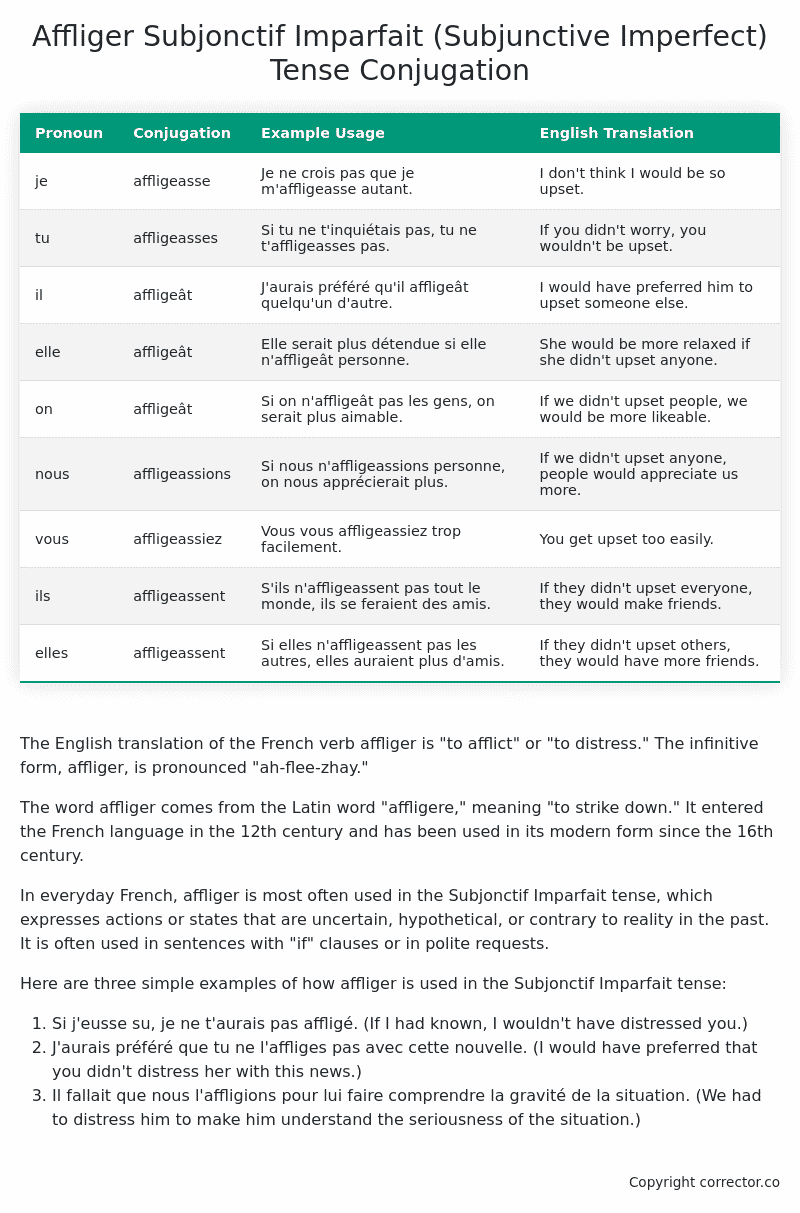Subjonctif Imparfait (Subjunctive Imperfect) Tense Conjugation of the French Verb affliger
Introduction to the verb affliger
The English translation of the French verb affliger is “to afflict” or “to distress.” The infinitive form, affliger, is pronounced “ah-flee-zhay.”
The word affliger comes from the Latin word “affligere,” meaning “to strike down.” It entered the French language in the 12th century and has been used in its modern form since the 16th century.
In everyday French, affliger is most often used in the Subjonctif Imparfait tense, which expresses actions or states that are uncertain, hypothetical, or contrary to reality in the past. It is often used in sentences with “if” clauses or in polite requests.
Here are three simple examples of how affliger is used in the Subjonctif Imparfait tense:
- Si j’eusse su, je ne t’aurais pas affligé. (If I had known, I wouldn’t have distressed you.)
- J’aurais préféré que tu ne l’affliges pas avec cette nouvelle. (I would have preferred that you didn’t distress her with this news.)
- Il fallait que nous l’affligions pour lui faire comprendre la gravité de la situation. (We had to distress him to make him understand the seriousness of the situation.)
Table of the Subjonctif Imparfait (Subjunctive Imperfect) Tense Conjugation of affliger
| Pronoun | Conjugation | Example Usage | English Translation |
|---|---|---|---|
| je | affligeasse | Je ne crois pas que je m’affligeasse autant. | I don’t think I would be so upset. |
| tu | affligeasses | Si tu ne t’inquiétais pas, tu ne t’affligeasses pas. | If you didn’t worry, you wouldn’t be upset. |
| il | affligeât | J’aurais préféré qu’il affligeât quelqu’un d’autre. | I would have preferred him to upset someone else. |
| elle | affligeât | Elle serait plus détendue si elle n’affligeât personne. | She would be more relaxed if she didn’t upset anyone. |
| on | affligeât | Si on n’affligeât pas les gens, on serait plus aimable. | If we didn’t upset people, we would be more likeable. |
| nous | affligeassions | Si nous n’affligeassions personne, on nous apprécierait plus. | If we didn’t upset anyone, people would appreciate us more. |
| vous | affligeassiez | Vous vous affligeassiez trop facilement. | You get upset too easily. |
| ils | affligeassent | S’ils n’affligeassent pas tout le monde, ils se feraient des amis. | If they didn’t upset everyone, they would make friends. |
| elles | affligeassent | Si elles n’affligeassent pas les autres, elles auraient plus d’amis. | If they didn’t upset others, they would have more friends. |
Other Conjugations for Affliger.
Le Present (Present Tense) Conjugation of the French Verb affliger
Imparfait (Imperfect) Tense Conjugation of the French Verb affliger
Passé Simple (Simple Past) Tense Conjugation of the French Verb affliger
Passé Composé (Present Perfect) Tense Conjugation of the French Verb affliger
Futur Simple (Simple Future) Tense Conjugation of the French Verb affliger
Futur Proche (Near Future) Tense Conjugation of the French Verb affliger
Plus-que-parfait (Pluperfect) Tense Conjugation of the French Verb affliger
Passé Antérieur (Past Anterior) Tense Conjugation of the French Verb affliger
Futur Antérieur (Future Anterior) Tense Conjugation of the French Verb affliger
Subjonctif Présent (Subjunctive Present) Tense Conjugation of the French Verb affliger
Subjonctif Passé (Subjunctive Past) Tense Conjugation of the French Verb affliger
Subjonctif Imparfait (Subjunctive Imperfect) Tense Conjugation of the French Verb affliger (this article)
Subjonctif Plus-que-parfait (Subjunctive Pluperfect) Tense Conjugation of the French Verb affliger
Conditionnel Présent (Conditional Present) Tense Conjugation of the French Verb affliger
Conditionnel Passé (Conditional Past) Tense Conjugation of the French Verb affliger
L’impératif Présent (Imperative Present) Tense Conjugation of the French Verb affliger
L’infinitif Présent (Infinitive Present) Tense Conjugation of the French Verb affliger
Struggling with French verbs or the language in general? Why not use our free French Grammar Checker – no registration required!
Get a FREE Download Study Sheet of this Conjugation 🔥
Simply right click the image below, click “save image” and get your free reference for the affliger Subjonctif Imparfait tense conjugation!

Affliger – About the French Subjonctif Imparfait (Subjunctive Imperfect) Tense
Formation
Common Everyday Usage Patterns
Interactions with Other Tenses
Subjonctif Présent
Indicatif Passé Composé
Conditional
Conditional Perfect
Summary
I hope you enjoyed this article on the verb affliger. Still in a learning mood? Check out another TOTALLY random French verb conjugation!


